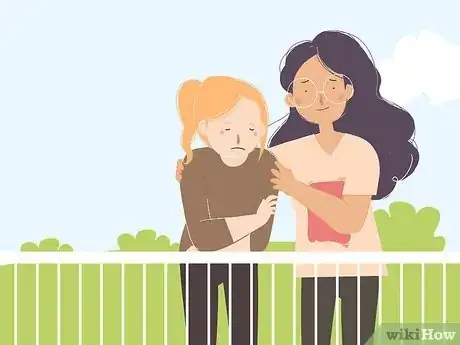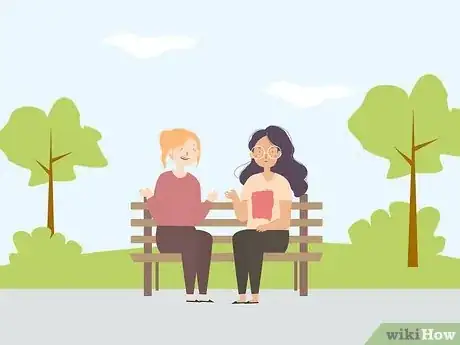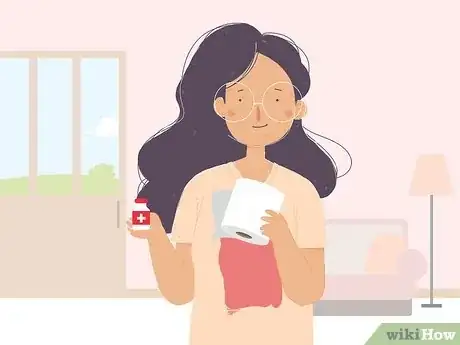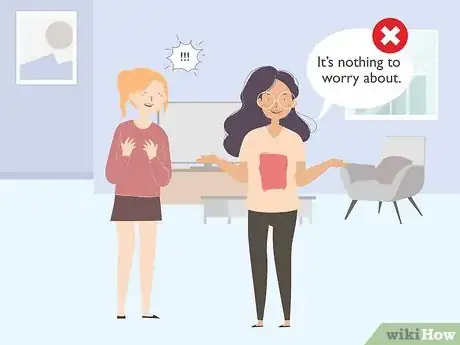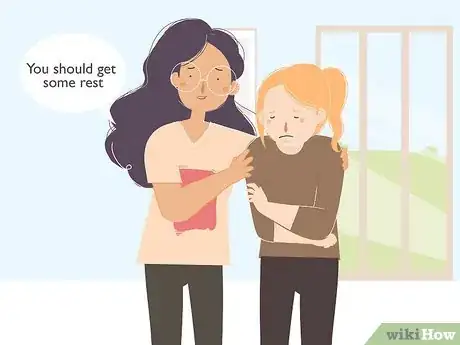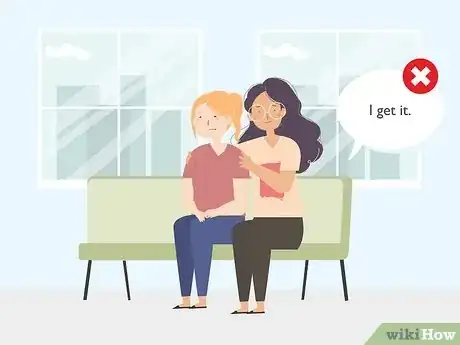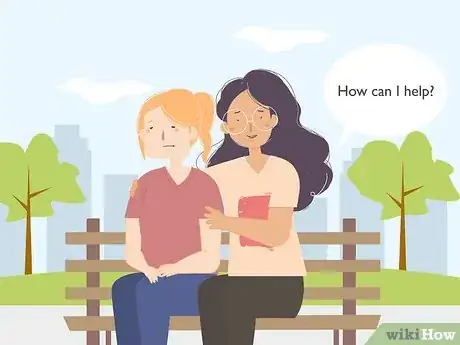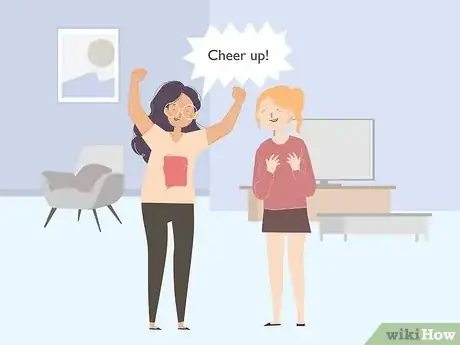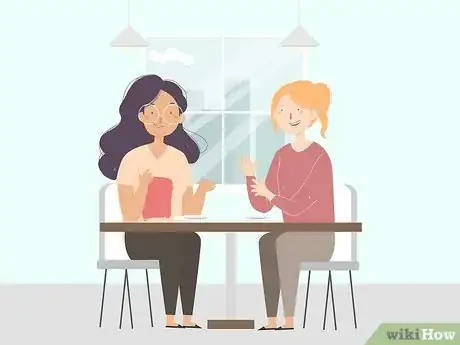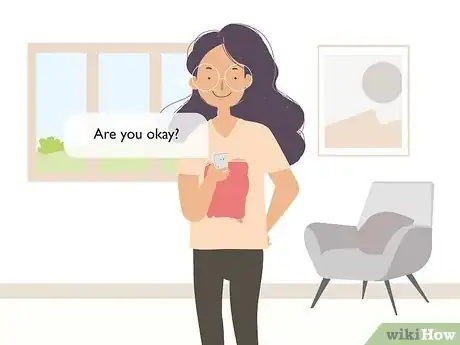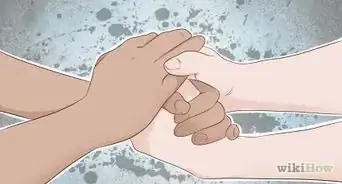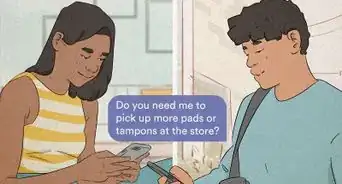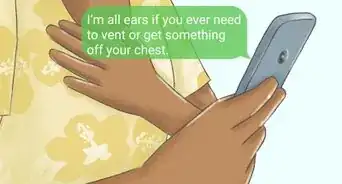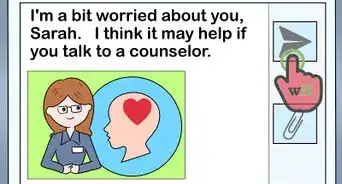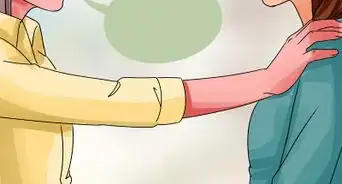This article was co-authored by Hyungbum Kang, MA, MSW, LCSW, MAC. Hyungbum Kang is a Licensed Clinical Social Worker based in Honolulu, Hawaii. With over a decade of experience, Hyungbum specializes in using an integrated therapeutic approach to treat ADHD, Anger Management, Depression, and other mental health and social work struggles. He received a Bachelor’s degree in English and Master’s degrees in Sociology and Social Work. Hyungbum earned an MBA from Hawaii Pacific University (HPU) and is working on his Doctor of Psychology from HPU. He is a member of the American Psychological Association, the International Honor Society in Psychology, the National Association of Social Workers, and the California Consortium of Addiction Programs and Professionals.
There are 7 references cited in this article, which can be found at the bottom of the page.
wikiHow marks an article as reader-approved once it receives enough positive feedback. In this case, several readers have written to tell us that this article was helpful to them, earning it our reader-approved status.
This article has been viewed 642,711 times.
There can be times when your friend may be sad and you feel like comforting them. But how do you? Consoling an upset friend can be tricky. When you're trying to offer comfort, you may feel like you're constantly putting your foot in your mouth and making things worse. So, how do you console an upset friend, and actually make them feel better? Just be a good friend.
Steps
Cheering up Your Friend
-
1Show them some love. 99% of the time your friend needs a great big hug, an arm around the shoulder, or a gentle pat on the hand. Actions speak louder than words, and they're a lot easier to get right. So just shut up and hold them[1] -- you don't have to think of the perfect words or speech. Your friend may be too upset to start talking right away, and these little gestures can go a long way in making your friend feel less alone.[2]
- If your friend is trying to wriggle away, then clearly he or she doesn't want you touching them. Be respectful of them and you're doing just fine.
-
2Just listen. Make eye contact, nod occasionally, and make very short comments when necessary. Mostly, let your friend express him or herself and get everything off his chest, even if you want to say something.[3] You're not going to "fix" them -- period. So don't try. This isn't the time to give your opinion or to talk a lot. It's time to let your friend explain everything that has been troubling them so you can get a better sense of their worries.[4]
- If your friend isn't saying much, you can say, "Do you want to talk?" or "What's up?" Either your friend wants to talk about it and needs a little prodding, or he or she is just so upset that they aren't ready to talk yet, and all you have to do is be there.[5]
- You can make little comments like, "That must be so hard" or "I can't imagine what you're going through..." but don't overdo it. Don't say things like "Oh, I have been through that so many times!" Just be quiet and listen -- this isn't about you at all.
- Say "I'm here for you" or "I hear you're upset."[6]
Advertisement -
3Take care of the basics -- comfort, chores, errands -- for them. Maybe your friend is shivering in the rain. Get her inside and give her a blanket. Maybe she's been crying for an hour straight. Get her some tissues and some Advil. Maybe your friend is standing up telling you how upset he is while carrying a heavy backpack. Get him to sit down. If your friend is a little riled up, get him or her some chamomile tea. If your friend stayed up all night worrying, put him in bed. You get the idea -- be a bit of a nanny.
- Your friend may be so upset that he or she isn't looking out for his or her health or comfort. That's where you come in. Take it off their already crowded plate.
- Do not think that your friend will feel better if you open a bottle of wine or bring over a six pack. Alcohol is never the solution if a friend is upset-- it is literally classified as a depressant.
-
4Don't try and tell them "it's nothing to worry about" since they clearly think it is. Your friend can be upset for a variety of reasons. A serious reason: your friend just found out that his grandmother is in the hospital. A not-so-serious reason: your friend has just broken up with her boyfriend of six weeks. How angry would you be if someone tried to say, "suck it up, that's not a real problem?" They're upset because it is a real problem to them, so don't be a total jerk and try and minimize their issues.
- If your friend mopes about a short-term break-up for way too long, then you can deal with it later. But, in the first moments, you should be a friend, not a bully.
- Don't offer insensitive, useless comments like, "It's not the end of the world," "You'll get over it," or "It's really not that big of a deal."
-
5Don't pretend to be a psychiatrist. Unless your friend turns to you and says, "What do you think I should do?" you should not jump in and tell your friend the five best courses of action. It will come off as condescending: like you think your friend's problems can be solved so easily if they're weren't such dunces. Unless your friend is looking up at you with doe eyes, saying, "I don't know what to do..." give it time before you offer any advice.[7]
- To be honest, you probably don't know the best course of action either. Unless you're a trained psychiatrist or have first-hand experience, you're just as in the dark as them.
- You can say simple things like, "You should get some rest," or "Drink some chamomile tea and you'll feel better" just to offer your friend some minor comfort, but don't say things like, "I think you should call Bill right now and sort things out," or "I think you should apply to grad school right away." You're just making it up on the spot, whether you admit it or not.
-
6Don't say that you "get" it. This is another way to quickly annoy your friend. Unless you had once found yourself in an identical situation, you shouldn't say, "I know exactly how you feel..." because your friend will want to scream, "It's not the same!" And it's probably not the same! This isn't about you; it is about your friend. Sure, if the friend is upset because of a serious break-up and you happened to go through one of those puppies too, you can talk about it. But don't compare your three-month relationship to your friend's three-year relationship -- admit it is different.
- Saying, "I can't imagine how you feel" is better than "I know exactly what you're going through..." You don't know exactly what they're going through -- you're not them!
- Sure, it can be comforting for your friend to know that someone else had been through the same situation and survived, but if this is the case, you have to phrase it delicately. Be more reassuring, "you're an amazing person, and you can handle this," then self-assured, "I got through this exact thing, so you can too."
-
7Leave them alone if they want private time. Not everyone who is upset wants affection or a kind ear. Some people deal better with things alone, and some people may want to be left alone after talking a problem through. Think about it -- how often have you just wanted some peace and quiet when you feel bad? Don't stick around if you're not wanted; if your friend says he or she needs some alone time, chances are he or she means it.[8]
- If you think your friend is in danger of harming himself or herself, you must stick around whether they want it or not.
-
8Ask them straight-up how you can help. Maybe there's a concrete solution and you can help fix it. Sometimes, there is no good solution but a bucketful of ice cream and a bunch of really crappy movies can do the trick. Just ask -- don't feel like you need to read their mind in order to be Mr. Super-Friend.[9]
- If they say nothing, then just let them be, already! They're not playing games, they want to be alone.
- If your friend thinks that you're doing so much for him or her and feels bad about it, remind that friend of a time when he or she was there for you when you really needed it. That's what friends are for, aren't they?
Going the Extra Mile
-
1Bust them up with some light humor. If your friend isn't suffering from a major loss, then you can cheer him or her up by making a small joke or acting like a goofball. If they don't respond, don't push it! But if you give it some time and start trying to cheer your friend up through laughter, it may pay off. Laughter really is the best medicine, and if you can make a joke about the situation that isn't offensive, or just poke fun at yourself to distract your friend, it'll offer some temporary relief.
- Obviously, if your friend is absolutely devastated, then humor is not your best bet.
-
2Distract your friend with games, events, and dates. Keep them as busy as possible. You don't have to drag your friend out to the clubs or put together an elaborate surprise party. You should come over to your friend's house with a movie and a big 'ole tub of popcorn. Go for a walk. Keeping your friend busy can take some of the pain away, even if your friend is resisting at first. They'll need some prodding, and some "fun patrolling," but that's what you're there for.
- Your friend may say something like, "I don't want to hang out because I'm just going to be a major downer..." and you can say, "That's ridiculous! I love hanging out with you no matter what."
- Your friend may be hanging out in his cave-like bedroom. Just getting him or her out of the house and into some fresh air, even if you're only walking to the coffee shop down the street, will do him good physically and mentally.
-
3Do some favors for your pal or bring them dinner. If your friend is really upset, then it's likely that he or she is neglecting his basic duties and chores. That's where you come in. If your friend is forgetting to eat, bring over some lunch or come over and cook dinner. If your friend hasn't done laundry in two months, bring over some detergent (you'll both be thankful for it). Pick up your friend's mail. If he or she is staying home from school, pick up his homework assignments. These little favors may not seem like that big of a deal when your friend is incredibly upset, but they do add up.
- They aren't a helpless little puppy, but they do need some coddling and support if they are particularly upset. Don't treat them like a baby, treat them like a friend who just needs an extra leg to stand on.
-
4Check in on them with regular calls, texts, and visits. Unless you and your friend have identical schedules, it's inevitable that you will be spending some time apart. But if you know your friend is really upset you can't just fly off the grid completely. No one wants to be asked "Are you okay?!?!" constantly, but they do want to see their friends and have a decent convo every once in a while.
- Be slicker than, "I'm just calling to see how you're doing." Make up an excuse to call, like asking if your friend has seen your brown coat, and then end up asking your friend to lunch. Or just tell them a story from your day! Again -- this is simple stuff when you really think about it -- you're just being a good friend!
-
5Just be there, even if you don't know what to do. You will rarely solve a friend's problems for him or her, or even find the best solution. Usually, your friend has to wait it out or figure it out on his or her own, even though it sucks in the meantime. What you can do most of the time is be a shoulder for your friend to cry on, a comforting voice to listen to in the middle of the night, and a source of kindness, reason, and comfort.[10]
- Make an effort to clear up your schedule and to devote more time to being there for your friend. He or she will be grateful for the effort you have made to make him or her feel better.
- Don't give up your life for theirs. At the end of the day, this is their baggage to work through. You are there as support, not as a savior.
Expert Q&A
-
QuestionHow do you show someone your support?
 Hyungbum Kang, MA, MSW, LCSW, MACHyungbum Kang is a Licensed Clinical Social Worker based in Honolulu, Hawaii. With over a decade of experience, Hyungbum specializes in using an integrated therapeutic approach to treat ADHD, Anger Management, Depression, and other mental health and social work struggles. He received a Bachelor’s degree in English and Master’s degrees in Sociology and Social Work. Hyungbum earned an MBA from Hawaii Pacific University (HPU) and is working on his Doctor of Psychology from HPU. He is a member of the American Psychological Association, the International Honor Society in Psychology, the National Association of Social Workers, and the California Consortium of Addiction Programs and Professionals.
Hyungbum Kang, MA, MSW, LCSW, MACHyungbum Kang is a Licensed Clinical Social Worker based in Honolulu, Hawaii. With over a decade of experience, Hyungbum specializes in using an integrated therapeutic approach to treat ADHD, Anger Management, Depression, and other mental health and social work struggles. He received a Bachelor’s degree in English and Master’s degrees in Sociology and Social Work. Hyungbum earned an MBA from Hawaii Pacific University (HPU) and is working on his Doctor of Psychology from HPU. He is a member of the American Psychological Association, the International Honor Society in Psychology, the National Association of Social Workers, and the California Consortium of Addiction Programs and Professionals.
Licensed Clinical Social Worker Find out why your friend is feeling upset first. Then, say something supportive and empathetic, like "I understand that you are upset."
Find out why your friend is feeling upset first. Then, say something supportive and empathetic, like "I understand that you are upset." -
QuestionHow do I console a friend I accidentally hurt?
 Community AnswerAccept your mistake. Yes, if they are very angry at you then maybe, then there is no time for reasoning and console instead. If he/she is your best friend, they are likely to quickly understand and make up with you. But, if they don't, just try convincing them, that you'll not do what you did twice and showing them as much love and trying to make them laugh. They will eventually come around, if its a genuine apology from your side.
Community AnswerAccept your mistake. Yes, if they are very angry at you then maybe, then there is no time for reasoning and console instead. If he/she is your best friend, they are likely to quickly understand and make up with you. But, if they don't, just try convincing them, that you'll not do what you did twice and showing them as much love and trying to make them laugh. They will eventually come around, if its a genuine apology from your side. -
QuestionHow do I cheer up a friend that is sad and won't tell me why?
 Community AnswerLet your friend know you are there for him and ask if he wants to spend time together. Don't push him to tell you what is wrong. Just volunteer to hang out and have fun together.
Community AnswerLet your friend know you are there for him and ask if he wants to spend time together. Don't push him to tell you what is wrong. Just volunteer to hang out and have fun together.
Warnings
- Do not force them to tell you what is wrong. If they don't want to tell yo you what's going on, respect their privacy and don't take it personally.⧼thumbs_response⧽
- Never make it about yourself. If your friend tells you they are sick of the school bully picking on them don't say, "That's not as bad as the time last year when...(and then proceed to tell a story about yourself)". Offer to solve their problem. They opened up to you, so show some compassion!⧼thumbs_response⧽
- Say something kind, like "I love you no matter what you look like or do and no matter who you are."⧼thumbs_response⧽
References
- ↑ fhttps://www.psychologytoday.com/us/blog/lifetime-connections/201606/the-undeniable-power-simple-hug
- ↑ Michelle Joy, MA, MFT. Licensed Marriage & Family Therapist. Expert Interview. 26 June 2020.
- ↑ Michelle Joy, MA, MFT. Licensed Marriage & Family Therapist. Expert Interview. 26 June 2020.
- ↑ https://www.psychologytoday.com/us/blog/suffer-the-children/201901/6-tips-compassionate-listening
- ↑ https://www.psychologytoday.com/us/blog/5-types-people-who-can-ruin-your-life/201801/calming-upset-people-fast-ear
- ↑ Hyungbum Kang, MA, MSW, LCSW, MAC. Licensed Clinical Social Worker. Expert Interview. 22 July 2021.
- ↑ https://www.psychologytoday.com/us/blog/changepower/201410/9-ways-be-there-friend-without-giving-advice
- ↑ https://www.headstogether.org.uk/10-things-to-say-to-someone-with-depression/
- ↑ Michelle Joy, MA, MFT. Licensed Marriage & Family Therapist. Expert Interview. 26 June 2020.
- ↑ Michelle Joy, MA, MFT. Licensed Marriage & Family Therapist. Expert Interview. 26 June 2020.
About This Article
To console an upset friend, the best thing you can do is just listen to what your friend has to say and offer them support if they need it. You can also show them you care with a big hug or an arm around their shoulder. Just avoid telling them how to solve their problems or acting like you know exactly how they feel since it could rub your friend the wrong way. Also, don't try to minimize their situation by telling them that the situation isn't a big deal or that they'll get over it, which could just upset them more. To learn how to do nice things for your friend so they feel better, scroll down!
